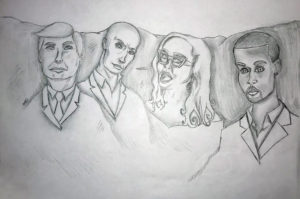by the squall staff

When Oprah Winfrey gave a commendable speech on the #MeToo movement at the Golden Globes, the nation was understandably ecstatic. In attacking sexual abuse and warning abusers that “their time was up,” she tied us all together at a time when we’re quite far apart.
Whether you were a Hollywood superstar, average joe, office worker, or just a procrastinating high school student, it resonated with you. On social media, feeds lit up with yells of Winfrey 2020, while the talking heads on cable news spent hours salivating over the possibility of a Trump vs. Winfrey election. In an amazing twist, celebrities with zero legislative experience are now being seriously contended as presidential candidates, a reality that seems unsurprising when one lives under the Celebrity-in-Chief himself.
In today’s time, it makes great sense why we often feel much more attachment to celebrities than to our own representatives in government. Politics in the past few years has become a glop of partisan policy and immaturity, more fueled by those with the “free speech” of cash donations than those with simply their voice alone. On the other side of the coin, it’s never been a better time to be a celebrity. Instead of receiving hate mail, celebrities receive fan letters by the hundreds, and instead of having to make the tough kind of decisions that often alienate half the population, celebrities can become adored almost universally in just 120 minutes worth of film.
Politicians and celebrities both are involved in the business of entertainment, it’s just the latter does a much better job at it than the former. Celebrities don’t have any of the kind of baggage that usually comes with politicians, or at least, not on the same level. You’d be hard pressed to find among the top celebrities of the country any kind of baggage like Benghazi, the Iraq war, or Obamacare. In politicians, however, the stream is almost endless. Government is a history of decisions, which includes both good and bad ones. As a society, however, we tend to remember and even inflate these decisions that were bad. As a result, we are often more prone to choose the person over experience, the latter of which comes along with the uncomfortable baggage of past decisions.
Experience, however, is where all the skills a president needs come from, not celebrity. Out of all the skills that are necessary for a functioning president, three come before all others: political knowhow, management skills, and a good temperment. If a president cannot take advantage of the system and grease the wheels of government in their favor, they are left with few successes. If a president is fighting a war with his own white house staff and is finding administrational complex frightening, they become distracted with infighting and disorganized. Finally, if a president is unable to handle the large pressures of the office, their rash decisions or poor remarks will sink their popularity. If you lack in one of those qualities, you’re already treading water. If you lack in two or even all three, then your days in office are most likely numbered.
Celebrities, however, certainly aren’t prone to following political norms or rules. When candidates campaigned in the past, there used to be at least a pretense of being civil about the issues. Today, however, one could easily make the case that government is more about mudslinging and hand size than they’ve ever been: it’s a clear-cut case of what happens when campaigns are more about the person than the ideas behind them. When considering whether or not to vote for Winfrey, you don’t take into account if she’d need to order a drone strike or negotiate us out of a government shutdown; you’re thinking about when she gave everyone in the audience of her TV show a brand new bow-topped Pontiac G6.
Celebrity candidates have realized that it’s not their ideas that are getting them across the finish line, but the characters they’ve created. There’s a reason why Donald Trump marketed himself as the dealmaker in the election; everyone knew him from his Celebrity Apprentice TV show, and, regardless of whether he was as good as his TV personality in the real world with dealmaking and business, people fell in love with the character he had created for himself. They truly believed that Mexico was going to pay for the wall — with or without their permission — because he was the master dealmaker.
In reality, however, Donald Trump is a man whose most popular tweet is not a message that brings the nation together but a video of him beating up a CNN logo at a WWE event. When the lines between entertainment and politics have become so blurred, this preference for characters over reality is the only logical conclusion to a process that’s been happening for years.
But it doesn’t have to be this way. The only reason why it’s becoming a trend for celebrities to make claims of running for the presidency is because we’re okay voting for them. What people need to do when thinking of a celebrity as president is to separate them from their character, music, or personality. Instead of gunning it for the presidency after a few good PR stunts, we should encourage celebrities to start small, learn the ropes, and prove themselves in offices less consequential than one with 4,018 nuclear warheads at its disposal.
In fact, it would probably be a humbling and educational moment for a celebrity to run for the mayorship of Detroit or Chicago. If they prove themselves to be knowledgeable and successful, then why not make the leap? We should hold celebrities to the same standard as regular politicians and make politics more about making all of us better off, rather than relegating it to another escape from an inescapable reality.
